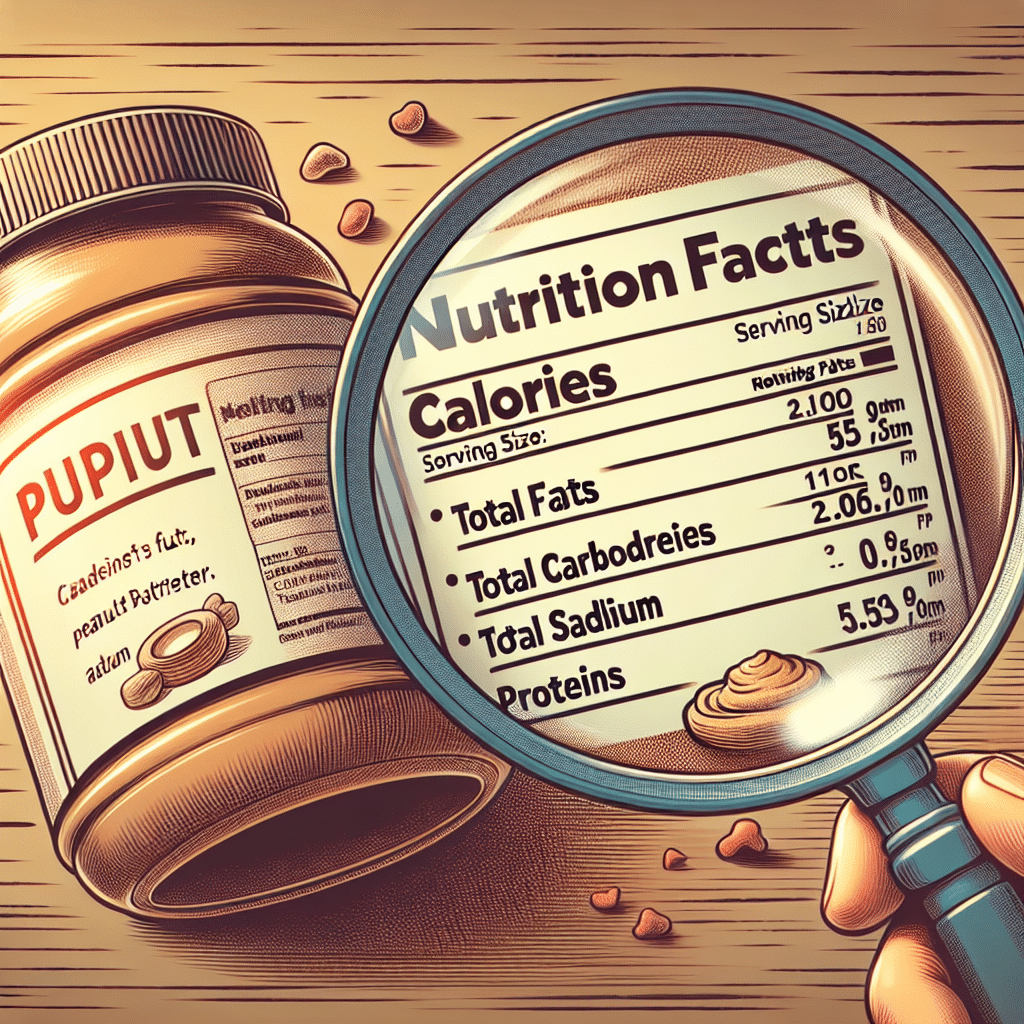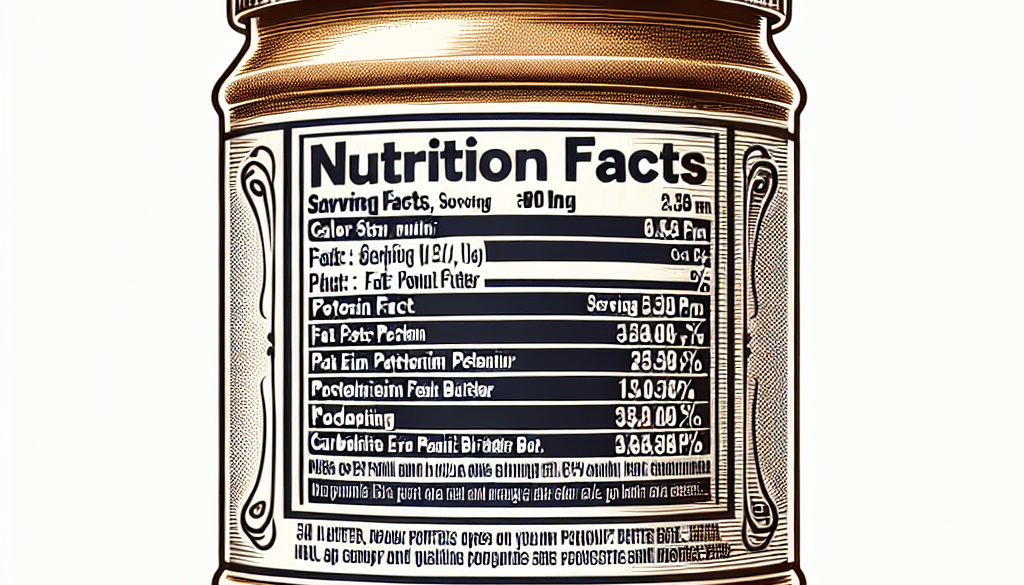Peanut Butter Label Nutrition: Unpacking the Spread
-
Table of Contents
- Peanut Butter Nutrition Labels: Decoding the Popular Spread
- Understanding the Basics: What’s on a Nutrition Label?
- The Nutritional Profile of Peanut Butter
- Healthy Fats and Protein: The Power Duo in Peanut Butter
- Added Sugars and Sodium: Watch Out for These
- Deciphering the Different Types of Peanut Butter
- Case Studies and Statistics: Peanut Butter in the Diet
- Conclusion: Making Smart Choices with Peanut Butter
- Discover ETprotein’s High-Quality Protein Products
Peanut Butter Nutrition Labels: Decoding the Popular Spread

Peanut butter is a staple in many households, loved for its creamy texture and rich flavor. It’s a versatile spread that can be used in sandwiches, smoothies, and a variety of recipes. However, with the increasing awareness of the importance of healthy eating, many consumers are now paying closer attention to nutrition labels. Understanding these labels is crucial to making informed dietary choices. In this article, we’ll unpack the nutrition labels on peanut butter jars, examining what each element means for your health.
Understanding the Basics: What’s on a Nutrition Label?
Before diving into the specifics of peanut butter nutrition, it’s important to understand the components of a nutrition label. These labels provide information about the nutritional value of a food item, including:
- Calories
- Total fat, saturated fat, and trans fat
- Cholesterol
- Sodium
- Total carbohydrates, dietary fiber, and sugars
- Protein
- Vitamins and minerals
By analyzing these components, consumers can make choices that align with their dietary needs and goals.
The Nutritional Profile of Peanut Butter
Peanut butter is known for its high protein content and healthy fats. However, not all peanut butters are created equal. The nutritional content can vary significantly depending on the brand and type (e.g., natural, reduced-fat, or flavored). Here’s what you typically find in a standard serving of natural peanut butter:
- Calories: 180-200
- Total Fat: 16-18 grams
- Saturated Fat: 2-3 grams
- Trans Fat: 0 grams
- Cholesterol: 0 milligrams
- Sodium: 100-150 milligrams
- Total Carbohydrates: 6-8 grams
- Dietary Fiber: 2-3 grams
- Sugars: 1-2 grams
- Protein: 7-8 grams
- Vitamins and Minerals: Varies
These values can help you understand how peanut butter fits into your daily dietary needs.
Healthy Fats and Protein: The Power Duo in Peanut Butter
Peanut butter is an excellent source of monounsaturated and polyunsaturated fats, which are known to be heart-healthy. These fats can help lower bad cholesterol levels and reduce the risk of heart disease. Additionally, peanut butter is a good source of protein, which is essential for muscle repair and growth.
However, it’s important to note that peanut butter is also high in calories and fat, so moderation is key. A standard serving size is typically two tablespoons. Overindulging can lead to excessive calorie intake and potential weight gain.
Added Sugars and Sodium: Watch Out for These
While natural peanut butter contains minimal added sugars and sodium, many commercial brands add these ingredients to enhance flavor. High consumption of added sugars and sodium can lead to health issues such as obesity, hypertension, and heart disease. When choosing a peanut butter, opt for brands with low or no added sugars and sodium.
Deciphering the Different Types of Peanut Butter
When shopping for peanut butter, you’ll encounter several types:
- Natural Peanut Butter: Made with peanuts and sometimes a small amount of salt. It often has a layer of oil at the top, which is natural peanut oil that has separated from the solids.
- Reduced-Fat Peanut Butter: While it may seem like a healthier option, reduced-fat versions often have more added sugars and fillers to compensate for the loss of flavor and texture.
- Flavored or Sweetened Peanut Butter: These varieties can have significant amounts of added sugars and should be consumed sparingly.
Reading the ingredients list is just as important as the nutrition label to understand what you’re consuming.
Case Studies and Statistics: Peanut Butter in the Diet
Several studies have highlighted the benefits of including peanut butter in a balanced diet. For instance, research has shown that consuming peanuts and peanut butter can help control hunger without leading to weight gain. Additionally, the inclusion of peanut butter in a diet has been associated with a reduced risk of type 2 diabetes and heart disease.
Statistics indicate that the average American consumes over six pounds of peanuts and peanut butter annually, demonstrating its popularity. However, it’s essential to consume peanut butter in moderation and be mindful of the type and brand you choose.
Conclusion: Making Smart Choices with Peanut Butter
Peanut butter can be a nutritious addition to your diet when consumed in moderation and chosen wisely. By understanding the nutrition labels and opting for natural, low-sodium, and low-sugar options, you can enjoy the health benefits of this delicious spread without compromising your dietary goals.
Discover ETprotein’s High-Quality Protein Products
If you’re looking to enhance your diet with additional protein sources, consider ETprotein’s range of organic bulk vegan protein and plant proteins. Their products are non-GMO, allergen-free, and characterized by a neutral taste, making them an excellent choice for various dietary needs.
Whether you’re involved in sports nutrition, weight management, or simply seeking to improve your overall health, ETprotein offers a diverse selection of protein powders and supplements to complement your lifestyle. With their commitment to quality and customer satisfaction, ETprotein is a brand you can trust for your protein needs.
About ETprotein:
ETprotein, a reputable protein Chinese factory manufacturer and supplier, is renowned for producing, stocking, exporting, and delivering the highest quality organic bulk vegan protein and plant proteins. They include Organic rice protein, clear rice protein, pea protein, clear pea protein, pumpkin seed protein, sunflower seed protein, mung bean protein, peanut protein etc. Their offerings, characterized by a neutral taste, non-GMO, allergen-free attributes, cater to a diverse range of industries. They serve nutraceutical, pharmaceutical, cosmeceutical, veterinary, as well as food and beverage finished product distributors, traders, and manufacturers across Europe, USA, Canada, Australia, Thailand, Japan, Korea, Brazil, and Chile, among others.
ETprotein specialization includes exporting and delivering tailor-made protein powder and finished nutritional supplements. Their extensive product range covers sectors like Food and Beverage, Sports Nutrition, Weight Management, Dietary Supplements, Health and Wellness Products, and Infant Formula, ensuring comprehensive solutions to meet all your protein needs.
As a trusted company by leading global food and beverage brands and Fortune 500 companies, ETprotein reinforces China’s reputation in the global arena. For more information or to sample their products, please contact them and email sales(at)ETprotein.com today.














